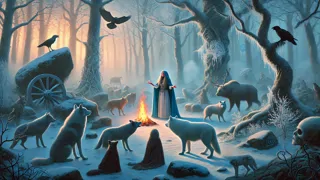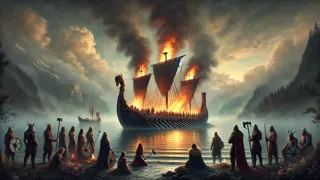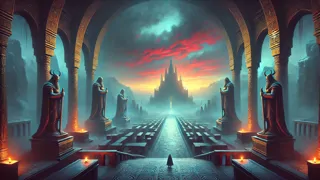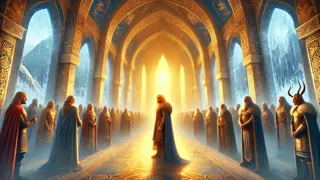Introduction
In the time before time, when Norway’s wild fjords were wreathed in perpetual mist and snow, the worlds were bound together by roots and branches of Yggdrasil. In the high halls of Asgard, gods laughed, plotted, and loved beneath golden beams that never fully pierced the northern twilight. Among them shone Baldr, radiant and gentle—a god whose presence seemed to warm even the coldest heart. He was the beloved of all, cherished by gods and mortals alike, his laughter echoing like chimes across the Bifröst Bridge. Yet, woven through every myth is a thread of darkness. Even in Asgard, where joy reigned and mead flowed, shadows gathered at the edge of every tale. None was more haunting than the foreboding dreams that began to trouble Baldr’s sleep, dreams that chilled his mother Frigg’s heart and whispered of loss to come. For in the ancient world of Norse myth, fate was a force none could escape—not even the most cherished. The gods of Asgard, for all their power, stood helpless before prophecy’s shadow. And so began a series of choices, born of love, fear, and cunning, that would unravel the very fabric of their golden age. As Frigg scoured the Nine Worlds in a desperate quest to shield her son, and Odin rode into the underworld seeking answers, another watched from the shadows: Loki, the trickster, whose restless mind saw opportunity where others saw doom. The story of Baldr’s death is not just a tale of loss—it is the tremor before the storm, the sorrow that sets the stage for Ragnarök. In these snowbound halls, where destiny weaves its silent pattern, a mother’s love, a friend’s betrayal, and a god’s fate entwine, echoing through time like the northern wind over ice and stone.
Prophecies and Oaths: A Mother’s Desperate Protection
Baldr’s dreams were not the ordinary stirrings of sleep but visions steeped in dread. Each night, shadows crept over his mind—visions of darkness swallowing his light, a sense of being struck down amidst weeping gods. These dreams spread unease throughout Asgard. Even Thor’s booming voice faltered, and Odin’s single eye grew troubled. None felt the chill more than Frigg, Baldr’s mother, whose love for her son was as deep as the ancient sea. Frigg, goddess of foresight and wisdom, could not ignore these omens. In the quiet before dawn, she left Asgard and journeyed across the Nine Worlds. Her heart burned with determination. She pleaded with everything that lived or breathed: stones, trees, beasts, fire, water, metals—each received her solemn request not to harm her son. Even disease and poison she petitioned, her words binding and powerful. All swore oaths, moved by her grief and the beauty of Baldr’s spirit. Only mistletoe, overlooked as too small and harmless, went unbound.

When Frigg returned to Asgard, she announced that Baldr was now invulnerable. Relief swept through the halls. The gods, delighted, turned Baldr’s safety into a game. They hurled axes and spears, stones and even Thor’s mighty hammer at him, only to watch weapons fall harmlessly aside or shatter before reaching their mark. Laughter rang out—loudest of all from Loki, whose clever eyes missed nothing.
Yet beneath the laughter, Loki’s mind churned. He was the shapeshifter, the mischief-maker, sometimes friend, sometimes adversary. To Loki, the gods’ joy was a challenge. He disguised himself as an old woman and visited Frigg, feigning ignorance and concern. Through sly questions, he learned that only mistletoe had not sworn the oath. It was a tiny slip—a mother’s fatigue, a forgotten sprig on a tree—that would change everything.
Mistletoe grew in the shadowed woods beyond Asgard, pale and unremarkable amidst winter’s bones. Loki’s clever fingers fashioned a dart from its slender branch. Returning to the gods’ assembly, he found Höðr, Baldr’s blind brother, standing aside from the revels. Loki approached, voice smooth as silk. He offered Höðr the dart and guided his hand. "Let your aim join in the sport," he urged. Trusting his companion, Höðr obeyed.
As the dart flew from Höðr’s grasp, a silence fell so heavy it seemed to freeze time. The mistletoe struck Baldr in the heart. The radiant god staggered and fell. The laughter died. The gods rushed to his side, but Baldr’s light was already fading—his life slipping from Asgard like the last warmth of sunset. Grief tore through the golden hall, a sound raw and unending. Frigg collapsed in anguish. Höðr stood petrified by horror. And Loki, mask gone, slipped into the shadows—his part played in fate’s cruel game.
Grief and Vengeance: The Descent into Darkness
The loss of Baldr shattered Asgard. The halls once bright with song grew dim. Frigg’s cries echoed through the realms, her grief so vast it seemed to bend the sky itself. Gods and goddesses wept openly. Even Odin, whose wisdom encompassed the fates of worlds, felt a wound deeper than any battle could deliver. His son—the hope of Asgard—was gone, and the world seemed colder for it.

Funeral preparations began. The gods built a magnificent pyre aboard Baldr’s ship Hringhorni. The vessel stood at the edge of the fjord, decked with flowers and treasures, a testament to the love and honor Baldr inspired. His wife, Nanna, overcome by sorrow, collapsed and joined him in death. The gods laid her beside Baldr and placed his gleaming ring Draupnir on his chest. Even Thor, mighty and stoic, could barely contain his tears as he set the ship alight with Mjolnir.
As Hringhorni slipped into the icy waters and the flames soared toward the heavens, all creation seemed to pause. Smoke curled against the northern sky. The Aesir and Vanir stood in silence, watching their brightest light vanish beyond the horizon. Dwarves and elves mourned, and frost giants in distant Jotunheim shuddered at what this loss might portend.
Odin, restless with pain and foreboding, mounted Sleipnir and rode to Helheim. He sought Hela, goddess of the dead, bargaining for Baldr’s return. Hela’s heart, colder than the grave, would only relent if every being wept for Baldr. Messengers sped through the worlds. Trees dripped sap; stones glistened with dew; men and beasts wailed. Yet in a hidden cave sat an old crone—Loki in disguise—whose refusal sealed Baldr’s fate. No tears from her meant Baldr must remain among the dead.
With Baldr lost and Loki’s guilt revealed, the gods’ sorrow turned to fury. They hunted Loki, who fled into the wild places. His capture was inevitable. Bound with the entrails of his own son beneath the earth, venom dripping onto his face, Loki’s punishment was as terrible as his crime. Yet even in chains, his laughter echoed—a bitter promise that the story was not yet done.
The Seeds of Ragnarök: Destiny Unraveled
With Baldr lost to the world of the dead, Asgard could never truly recover. The golden age was over; a chill seeped into every corner of the gods’ realm. Frigg’s silence became legend—her laughter never heard again. Odin retreated into deeper contemplation, seeking knowledge in the runes and shadows. Even Thor’s strength felt hollow against the weight of prophecy.

For the death of Baldr was not only a tragedy; it was a sign. The ancient seers whispered that this loss would herald Ragnarök—the end of gods and worlds. Wolves howled louder in distant forests, and Midgard trembled in anticipation. Bonds frayed between friend and foe. The Vanir grew restless. Giants stirred beyond the mountains. Mortals found their dreams haunted by storms and omens.
Loki’s punishment did not end his influence. His writhing beneath the earth unleashed quakes and poison, foreshadowing the chaos to come. The gods knew that when he finally broke free, all bonds would shatter. Baldr’s death was not merely a loss of light; it was the first falling stone in an avalanche.
Yet even in sorrow, hope lingered like embers in frost. Some whispered that Baldr would return after Ragnarök, rising from Helheim to lead a new world. His purity would survive the flames and blood—light reborn from ruin. But until then, the gods waited and watched as destiny moved ever closer to its final reckoning.
Baldr’s memory haunted Asgard: his laughter echoing in empty halls, his kindness recalled in every act of mercy. The gods wore their grief like armor, bracing themselves for what fate would bring. For every legend has its cost, and every dawn is born from night.
Conclusion
The death of Baldr was not only the tragedy of a single god but the unraveling of an entire era. His loss pierced the heart of Asgard and cast a shadow over the destiny of gods and mortals alike. In Frigg’s unending sorrow, Odin’s haunted wisdom, and Thor’s subdued strength, the gods learned that even the brightest among them could not escape fate’s decree. Loki’s betrayal shattered the bonds of trust and love, sowing chaos that would echo until the world’s end. Yet within this darkness glimmered a stubborn hope—that beyond the fires of Ragnarök, Baldr’s light might return to guide a new beginning. The story endures not simply as a tale of loss but as a reminder that love and sacrifice shape the world as surely as doom and vengeance. In every echo of laughter and every tear shed beneath northern stars, Baldr’s memory lingers—a beacon through the ages, defying even the long shadow of the end.


















